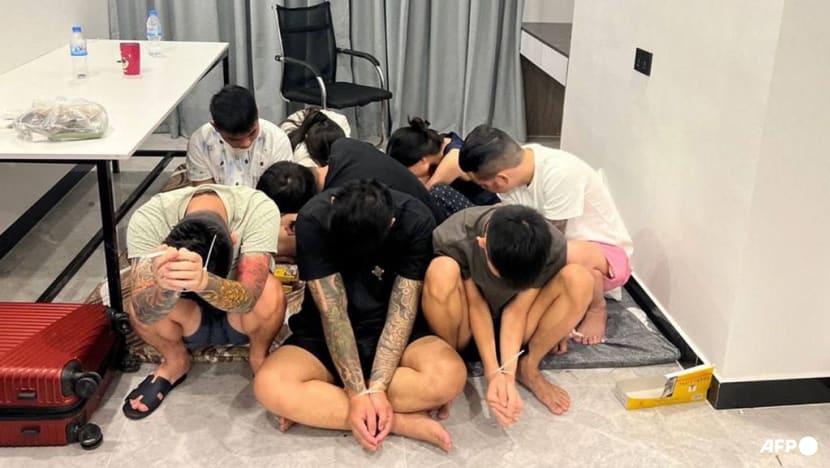Commentary: Raids, seizures, extraditions - but Cambodia's scam centres aren't going away
Cambodia has come under international scrutiny, following allegations of Prince Group’s scam links and the gruesome death of a South Korean student, says former foreign correspondent Nirmal Ghosh.

This pool photo taken on Jul 14, 2025 and released on Jul 16 by Agence Kampuchea Presse shows suspects with their hands zip-tied after being detained during a raid on a scam centre in Phnom Penh. (Photo: AFP)

This audio is generated by an AI tool.
SINGAPORE: Cambodia is under growing international pressure to crack down on the criminal syndicates that have garnered it a reputation as a global scam hub.
Raids and arrests have generated regular headlines. But while a lot of this action is new - and both overdue and welcome - appearances are deceiving.
The pressure on Cambodia comes mostly from countries like China, the United States, the United Kingdom and more recently South Korea. But there is less motivation within Cambodia, where the scam industry remains deeply and structurally embedded.
Neighbouring Thailand is also under pressure. But it is part willing and part obligated to take some action; its own nationalist lobby is an additional motivator as relations with Cambodia veer back to open hostility over their border dispute.
CAMBODIA UNDER INTERNATIONAL SCRUTINY
Pressure came from the US and the UK via sanctions on the sprawling Cambodia-based Prince Group and Huione Group, announced on Oct 14. Analysts saw that as a signal that the international community is getting serious about tackling syndicates.
Prince Holding Group operates dozens of business entities in more than 30 countries and profits from a “litany of transnational crimes” including sex-based extortion, money laundering, corruption, illegal online gambling and industrial-scale trafficking, torture and extortion of enslaved workers, the US Treasury and Justice Department notifications said.
The sanctions triggered investigations across the region, with several jurisdictions including Singapore and Taiwan seizing or freezing assets as part of investigations into the group.
The whereabouts of its founder and chairman Chen Zhi, a China-born Cambodian national, remain unknown. The group has also denied links to scam operations and has not been convicted of any crimes at the time of writing.
Meanwhile, Thailand on Nov 12 extradited to China the Chinese-Cambodian tycoon She Zhijiang to face charges of running over 200 illegal online casino sites worth billions of dollars. In October, the country revoked the Thai nationality of Cambodian politician Ly Yong Phat for alleged links to scam networks.
Anger in South Korea is additionally directed at the dimension of forced labour and human trafficking, after a South Korean student was tortured to death in Cambodia, reportedly by a crime ring. According to South Korea’s Ministry of Foreign Affairs, there had been 330 cases of South Koreans reported missing or held against their will in Cambodia this year, as of August.
South Korea has even begun displaying public warnings at Incheon International Airport for passengers departing for Cambodia, alerting them to the risks of fraudulent high-paying jobs, imprisonment and abduction.
SKIMMING THE SURFACE
Yet beneath a few high-profile sanctions and arrests, and more raids in Cambodia, its scam economy is still largely intact – with major kingpins untouched.
There is no evidence of shutdowns at any serious level, Lindsey Kennedy, Cambodia-based Research Director at The Eyewitness Project told me.
“Our understanding is, at the moment, that this is very much like every other time there's been a major crackdown,” she said. “You sweep up a couple of the low-level people, the small groups, the unprotected groups, or you basically persuade some of the bigger scam organisations to hand over some low-level people they don't mind losing, to make a show of it.”
Jason Tower, a Thailand-based senior expert at the Global Initiative Against Transnational Organized Crime (GI-TOC), concurred, telling me: “The needle has moved insofar as international pressure has risen to new heights,” but adding that on the ground, scam centres continue to operate.
POLITICAL AND STATE LINKS
Cambodia has been deeply penetrated by predominantly Chinese organised crime, and report after report mentions political and state complicity.
“Endemic corruption, reliable protection by the government, and co-perpetration by party elites are the primary enablers of Cambodia’s trafficking-cybercrime nexus and pose the chief barriers to combating the industry’s explosive growth,” notes a May 2025 report by UK-based Humanity Research Consultancy.
Transparency International’s 2024 Corruption Perceptions Index, which scored 180 countries on a scale from 0 (“highly corrupt”) to 100 (“very clean”), ranked Cambodia at 158 with a score of 21.
The 2025 US Trafficking in Persons Report (TIP) ranks Cambodia at Tier 3 - the lowest category - and calls on Phnom Penh to investigate and prosecute traffickers and operators, “including government officials”.
Cambodia observers told me that ordinary Cambodians are well aware of the scam industry, whose buildings and ancillary economic activities – drivers, retail and food delivery services and the like – are obvious. Many rely on the economic activity generated across neighbourhoods and districts.
Those objecting to or exposing criminal activity operate at risk to themselves. Journalists who have reported on cyberscam compounds have faced intimidation and arrests.
DEFLECTION DEFENCE
To be sure, the bad publicity has placed Cambodia’s government on the defensive – and it has tried to deflect.
In the wake of South Korea warning its citizens not to travel to certain areas in Cambodia, Cambodia’s Minister of Tourism Huot Hak said he guaranteed the safety and security of tourists, characterising incidents related to the online scam industry as isolated and mostly perpetrated by illegal foreign networks.
Cambodia recorded a total of 4.3 million international tourists in the first nine months of 2025, down 8.8 per cent over the same period last year, said its Ministry of Tourism earlier this month. The decline may not be attributable solely to concerns over scamming and trafficking; at least some may be related to armed clashes with Thailand in late July.
Cambodia’s fight with Thailand about borders is on the one hand a useful distraction and channels nationalist sentiment in Cambodia. But on the other hand, there is a risk that the Cambodian state may be seen as not up to protecting its national territory. The risk of incipient resentment against foreign, mainly Chinese-run scam centres and resentment against Thailand coalescing to put pressure on Cambodia’s ruling regime cannot be dismissed.
Perhaps most critical is the size of the scam industry in Cambodia. The World Bank estimates Cambodia’s 2024 gross domestic product at US$46.35 billion. Reports on the country’s scam industry, such as one published in May 2024 by the US Institute of Peace in Washington DC, have estimated its annual turnover ranges from US$12.5 billion to US$19 billion.
Experts say the scam industry is so pervasive and central to the economy, and the level of complicity of segments of the state so deep, that given the economic and political stakes, even the best-intentioned Cambodian authorities are themselves constrained. If they were to seriously move against the biggest kingpins and prosecute them, and take real steps to eradicate the industry, they would risk the country’s economy collapsing.
But until then, the crackdowns and headlines will continue – and so will the scams.
Nirmal Ghosh, a former foreign correspondent, is an author and independent writer based in Singapore. He is also on the Board of GI-TOC, but this piece is written in his personal capacity. He writes a monthly column for Â鶹, published every third Friday.













